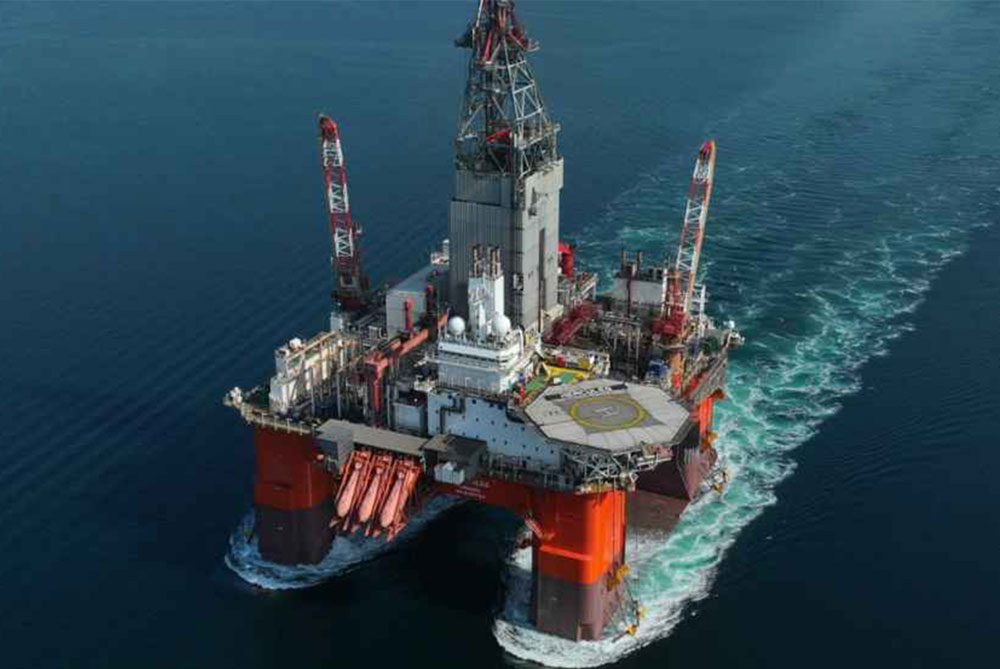

(WO) – According to the Norwegian Offshore Directorate, Equinor and its partners have made an offshore oil and gas discovery in wildcat wells 15/3-13 S and 15/3-13 A. The wells are part of the North Sea’s Gundrun field. Drilling was carried out by the Deepsea Stavanger rig. Preliminary estimates place the size of the discovery between 0.1 and 1.2 MMcm of recoverable oil equivalent in the intra-Draupne Formation, and between 0.4 and 1.3 MMcm of recoverable oil equivalent in the Hugin Formation. Source: Norwegian Offshore Directorate The licensees will assess the well results considering other prospectivity in the area. Geological information. The offshore wells’ primary exploration target was to prove petroleum in Late Jurassic reservoir rocks in the intra-Draupne Formation, as well as Middle Jurassic reservoir rocks in the Hugin Formation. The secondary exploration target was to prove reservoir in Early Cretaceous reservoir rocks in the Rødby Formation. Well 15/3-13 S encountered thin oil-bearing sandstone layers in the intra-Draupne Formation. The oil/water contact was not encountered. In the Hugin Formation, the well encountered a total of 92 m of sandstone with poor reservoir properties. Gas was encountered in two intervals, with respective thicknesses of 8 and 7 m. The gas/water contact was not encountered. A sidetrack, 15/3-13 A, was drilled with the objective of delineating the offshore oil and gas discovery. 15/3-13 A encountered oil in an 85 m thick interval in the intra-Draupne Formation, 13 m of which were intermittent sandstone layers with moderate reservoir quality. The oil/water contact was proven 4328 m below sea level. 15/3-13 A also proved about 100 m of sandstone with poor reservoir properties in the Hugin Formation. The entire interval was aquiferous, and no gas/water contact was proven. No reservoir was encountered in the secondary exploration target, the Rødby Formation in the Lower Cretaceous. The wells were not formation-tested, but extensive data acquisition and sampling were carried out. Well 15/3-13 S was drilled to respective measured and vertical depths of 4826 m and 4740 m below sea level. Well 15/3-13 A was drilled to respective measured and vertical depths of 4900 m and 4814 m below sea level. Both wells were terminated in the Sleipner Formation in the Middle Jurassic. The water depth is 110 m, and the wells have been permanently plugged and abandoned. Lead image source: Odjfell Drilling Article source: World Oil

Odfjell Drilling's Hercules semi-sub rig (Bloomberg) – Galp Energia SGPS SA’s shares jumped after the Portuguese oil company said a well test “potentially” indicates Mopane could be an important commercial find in Namibia. The stock climbed as much as 21% in Lisbon to €19.37, the highest since 2007. “The flows achieved during the well test have reached the maximum allowed limits of 14,000 boed, potentially positioning Mopane as an important commercial discovery,” Galp said in a regulatory filing on Sunday. “In the Mopane complex alone, and before drilling additional exploration and appraisal wells, hydrocarbon in-place estimates are 10 Bboe, or higher.” Oil finds by Galp in Namibia have added to discoveries drilled off the southwest African nation. In the past two years, majors Shell Plc and TotalEnergies SE have made finds that turned the sparsely populated country into a hotspot for exploration on the continent. Galp said on Sunday that it “successfully” completed the first phase of the Mopane exploration campaign with the conclusion of the Mopane-1X well testing operations. Galp said it plans to further explore, appraise and develop the wider Mopane complex. Lisbon-based Galp is the operator with 80% of the license area. National Petroleum Corp. of Namibia, or Namcor, and Custos each hold 10% stakes. Galp also holds stakes inoffshore oil blocks in Brazil. Lead image: A sign above the Galp Energia SGPS SA booth on day two of the Web Summit in Lisbon, Portugal, on Thursday, Nov. 3, 2022. The Web Summit runs from 1-4 November. (Photographer: Zed Jameson/Bloomberg) Joao Lima, Bloomberg April 22, 2024

CIPPE (China International Petroleum & Petrochemical Technology and Equipment Exhibition) is annual world’s leading event for oil & gas industry, annually held in Beijing. It is a great platform for connection of business, showcasing of advanced technology, collision and integration of new ideas; with the power to convene industry leaders, NOCs, IOCs, EPCs, service companies, equipment and technology manufacturers and suppliers under one roof across three days. China is the world’s largest oil and gas importer, also the second largest oil consumer and third largest gas consumer in the world. With the high demand, China is continuously increasing oil and gas exploration and production, developing and seeking for new technologies in unconventional oil and gas development. CIPPE 2024 will offer you an excellent platform for seizing the opportunity to enhance and increase your market share in China and the world, display products and services, network with existing and new clients, forge partnerships and discover potential opportunities. Welcome to visit JST at the CIPPE Exhibition (March 25-27, 2024) at Beijing·New China International Exhibition Center Booth W1212. JST has 29 years experience in the Oil & Gas seals designing and application. JST Seals is a leading manufacturer of high-performance seals for countless industries including oil and gas, semiconductor, LNG, chemistry, coal mining, medical equipment and others. We aim high and look far, providing professional and reliable sealing solutions for particular harsh applications. Contact us if need any seals!

We will have Chinese New Year Hoilday from 8th Feb. to 17th Feb. Thank you for all supports in 2023, wish you all the best in 2024.
© Copyright: 2026 Guangzhou JST Seals Technology Co., Ltd. All Rights Reserved.
Friendly Links:
VonesealsScan to wechat
